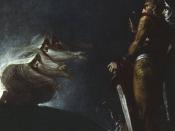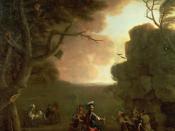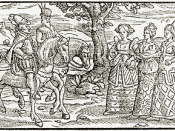Most people in Shakespeare time believed in the powers of witches, and witchcraft became the object of morbid and fevered fascination. Between 1560 and 1605 hundreds of people (mainly women) were convicted as witches and executed. Witches were credited with diabolical powers. They could predict the future, bring on night in daytime, cause fogs and tempests and kill animals. They cursed animals with fatal wasting disease and could raise evil spirits by concocting a horrible brew with nauseating ingredients. It was believed witches allowed the devil to suck their blood in return for a familiar (an animal used as an evil servant). Accused witches were examined for the 'devils mark', a red mark on their body from where Satan had sucked their blood. In 1604 an act of parliament decreed anyone found guilty of practicing witchcraft should be executed. If they were convicted they endured torture and death by hanging or burning at the stake.
The first scene of 'Macbeth' is very short, but full of impact. The thunder and lightning alone give it a dramatic opening, which grabs the interest of the audience, as it is representative of evil. These dramatic sound effects help to set the eerie and supernatural atmosphere that Shakespeare wanted to create along with the witches. Instead of seeing Macbeth, Shakespeare's audience is faced with three weird-looking women. The witches introduce us to a dark, dangerous play, in where the theme of evil is central. The witches say little but we learn a lot about them. From the beginning we can tell that the witches can foretell the future, and are creating some unpleasant magic, which is to involve Macbeth. This creates suspense for the audience, wondering what is going to happen next. The fact that the witches want to meet Macbeth should raise some suspicion in the audience. The witches first mention Macbeth in the eighth line, when they explain that they will meet him upon the heath. This shows the audience that the witches must know of Macbeth and leaves them assuming that Macbeth will be greatly influenced and affected by these three witches throughout the play.
The mood of the play is set here, although the action doesn't start until the next scene. The presence of supernatural forces in the opening of 'Macbethô provides for much of the play's dramatic tension and the mounting suspense. "When shall we three meet again? In thunder, lightning, or rain?" This is the opening line. It immediately draws the audience and captures their imagination, as the supernatural world fascinated people in Elizabethan England. The witches fit in with the stereotypical perception of witches of that time, including use of familiars like Graymalkin and Paddock.
Perhaps the most chilling part of the opening, is when the witches overturn the values in which we believe: ' Fair is foul, and foul is fairô, this basically seems like a warning that things are not what they appear to be, as if they are referring to people, explaining that not everybody should be trusted. This adds to our fear about what will happen to Macbeth.
In 'Macbeth' the witche's lines are extremely short and cryptic, this adds and indicates tension and excitement. The whole section is written in rhyme, with short seven or eight syllable lines, which are suggestive of a chant. The fact that Shakespeare uses very short lines and varies the rhythm in a number of ways helps to interest the audience. It is obvious to them that the witches are chanting a magical spell throughout their brief encounter. This creates a bleak and mystical atmosphere, together with suspicion as to why they are using their magical powers. The language reflects on the fact that 'Macbeth' is a dark play about evil, death, murder and ambition. The witches' language manages to reveal their personalities as sinister, mysterious and untrustworthy.
The story of Macbeth is an example of power at the expense of everything else. He begins the play as a strong character that is greatly admired, however as the play progresses Macbeth's personality and actions become more and more deceitful which eventually leads to his destruction. Following the murder of Duncan, Macbeth realises that the murder has put him into the control of demon forces which are the enemy of mankind. At the beginning of the play we are shown that the Elizabethans strongly believe in God. After Macbeth has killed Duncan he makes several holy references.
Elizabethan audiences believed in the divine right of kings. This is the belief that the kings is a special person and has been appointed by God. As did James I and Shakespeare, most people believed in the divine right of kings, so killing a king would be worse than a normal murder. People thought that if God had been upset then he would cause other tragic events to take place. This is why the audience would have been expecting the dreadful events following the death of King Duncan. Shakespeare mentions how the town had become panic stricken, and how there had been weird goings on. "ha, good father, thou seest the heavens, as troubled with mans act, threatens his bloody stage". In Act 2 scene 4, Ross and an old man exchange views on the darkness and unnaturalness of the events that mirror Duncan's murder. "Duncan's horses, beauteous and swift, turned wild in nature, contending 'gainst obedience". The two men discuss how they have seen with their own eyes, the sun being obscured, owls killing falcons and Duncan's horses eating each other. These misconducts would not have surprise the audience, but confirmed their beliefs. The way the whole country had been whipped into a frenzy over all the blood shed, is also brought up again in Act 4 scene 3, when Mac- Duff asks Malcolm for help to defeat Macbeth.
In the play 'Macbeth' we can argue that there are three possible choices for who is most responsible for the murder of King Duncan. The first choice is the witches. In the whole of the play they symbolise darkness and make a morally corrupt atmosphere. In Elizabethan times they were regarded as evil so these prophecies would be thought of as evil. Macbeth first meets the witches after the battle against Norway, and they predict that he will be Thane of Cawdor, and then King. At first he cannot believe this but when he finds out he is Thane of Cawdor, he and Banquo are surprised. In amazement Banquo says, "Can the devil speak true?". This shows us they did not expect the witches to be telling the truth. After this Macbeth seems to be astonished, which shows he is deep in thought about the third prophecy. We could therefore argue that the witches make him feel that it is his destiny to be king. Macbeth continues to think about the prophecies after this and drops hints to Banquo, for example he says, "Let us speak our free hearts to each other". He is trying to see whether Banquo would be interested in helping him. It also shows his great interest and desire for the throne. The prophecies also show he has been demonically possessed, due to the fact that at the end of act one, he invites spirits to possess his body, by saying, "comes you spirits". Finally at the start of scene act two, Macbeth tells the audience he his having visions in the comment, "Is this is a dagger I see before me".
The Witches played a big part in Macbeth's downfall. They were the first characters that influenced Macbeth as they met him at the start of the story. The Witches were determined from the start to influence Macbeth's way in life, they intended to meet with him from the start to begin his downfall, "There to meet with Macbeth". Before they started putting ideas into his head they had to make sure that he was willing to listen to them, so they waited until he was sure of his abilities, so they only started influencing him after the battle against Norway where he shone. As Macbeth would not normally listen to the telling of the Witches, they had to cleverly mix the truth, and things that had not happened yet to gain his confidence. They influenced Macbeth's first thoughts of killing Duncan as they first told him that he would be Thane of Cawdor, and he already was but he did not know yet. They then said that he would be King. This would have triggered his thoughts later on when he found out he was Thane of Cawdor. "All hail Macbeth, hail to thee, Thane of Glamis, hail to the Thane of Cawdor, All hail Macbeth, that shalt be King hereafter".
Although the witches did not directly tell Macbeth to kill King Duncan it gave him the idea, which then played on his ambitious mind. After Macbeth received the news that he was Thane of Cawdor he built a trust with the Witches as he now thought they were right about everything. Macbeth then thought about becoming King, he partially expected Duncan to name him as King until he picked Malcolm "The Prince of Cumberland, that is a step I must o'erleap". He then knew he was not within a chance of becoming King. The Witches are determined to let Macbeth complete his "tasks" that they have set him, so they indirectly tell Macbeth to kill Banquo by revealing to him that Banquo's sons will be Kings. This prevents Banquo stopping Macbeth when he might have. The Witches also stop Macbeth from wanting to change his mind, by making him overconfident and telling him that "none of woman born shall harm Macbeth". They also tell him " Macbeth shall never vanquished be, until Great Birnam wood to high Dunsinane hill shall come against him". These predictions make Macbeth arrogant, as he believes that these happenings are impossible realistically. He does not think of what they may really mean. This then leads to the death of Macbeth in the final act as Macbeth prepares to fight the English army lead by Malcolm. The English army camouflage themselves using branches from Great Birnam wood so that it appears that the forest is moving up to Dunsinane hill. Macbeth is finally killed by Macduff who was born by a Caesarean operation, and therefore he was not of woman born. The Witches played a big part in Macbeth's downfall as they firstly excite his ambition, they then kept Macbeth going but at the same time confused him into thinking that he was invincible but he was clearly not.
We could put less blame on the witches by saying that they have merely put forward and highlighted the ideas that are already in Macbeth's head. He has great ambition and may already want to be king so the witches therefore could not be totally responsible and are just encouraging him. The witches change Macbeth's outlook upon the crown, but are not directly involved while they do this. We can see it is quite easy to resist the witches as demonstrated by Banquo. This shows us he can control his thoughts, but Macbeth, however, has a weak point and cannot control his vaulting ambition.
From the start Macbeth is not as committed to the murder of Duncan as Lady Macbeth is, this is because Macbeth is too noble and loyal towards Duncan. However, when he finally kills the king his wife is driven mad by the guilt. You can tell Macbeth was weak minded at the start of the story as he hallucinates on his way to kill Duncan "Is this a dagger which I see before me?". Also when Banquo is killed he hallucinates Banquo's ghost coming to haunt him and makes a mockery of himself in front of his guests. After the death of King Duncan it only spurs Macbeth on to more evil deeds. He is corrupt and slaughters all that get in his way, he is told that Banquo's sons will be kings so he kills his close friend Banquo. He then tells Lady Macbeth that he has arranged to kill Banquo and he comments that she "marvell'st at my words". This shows that Lady Macbeth realises the sudden change in Macbeth's ways. He becomes a tyrant; he is obsessed with killing and he instructs his soldiers to, "hang those who talk of fear", he threatens to hang the servant who brings the news of Birnam wood to Dunsinane hill if he is telling the truth. Macbeth is too ambitious to realise that he will die in the final battle as what the Witches told him gives him a strong belief in his personal abilities. This is shown when the prophecy about Birnam wood actually comes true. Macbeth nearly gives up hope especially when his wife kills herself. The one thing that keeps him going is that "none of woman born shall harm Macbeth".
The Witches played a larger part in the death of Macbeth than Lady Macbeth did, but Macbeth's belief in personal abilities could put the greater share of the blame on Macbeth himself. Macbeth's ambition made him blind to the other side of what the Witches had to say, as he was ambitious when things went his way. After the tellings of the Witches he made himself believe that he was invincible and refused to think of the consequences of the actions which he took.
Macbeth was responsible for the murder of King Duncan, and finally his own death. He committed the murder and let ambition rule him despite knowing the consequences. His ambition was the spur to prick his intent. I think Lady Macbeth had a smaller part to play but in a way acted as catalysts for the murder. The witches should be held most responsible for the tragedy. Every time Macbeth's confidence fell the witches would intervene and boost his ego again by twisting the truth and making him feel unbeatable. If the witches hadn't planted the thoughts of him being king in his head in the first place, then Macbeth would have probably been content with his current responsibilities, or may, in later years, have even gained the crown in a honorable way.
Works CitedBooth, Stephen "King Lear," "Macbeth," Indefinition, and Tragedy (New Haven: Yale University Press, 1983), p. 83.
Fairchild, A. H. R. "A Note on Macbeth." Philological Quarterly 4 (1925): 348-50.
Fawkner, D. H. Deconstructing "Macbeth" (London: Associated University Presses, 1990), p. 123Fergusson, Francis. "Macbeth as the Imitation of an Action." English Institute Essays (1951): 31-43.
Freer, Coburn. The Poetics of Jacobean Drama. Baltimore: Johns Hopkins UP, 1981.
Preminger, Alex, and T. V. F. Brogan, eds. The New Princeton Encyclopedia of Poetry and Poetics. Princeton: Princeton UP, 1993.
Rauls, Margie. "The Image of Echo and Reverberation in Macbeth." College Language Association Journal 32 (1989): 361-72.
Shakespeare, William. The Complete Works of Shakespeare. Ed. David Bevington. 4th ed. New York: Harper Collins, 1992.





